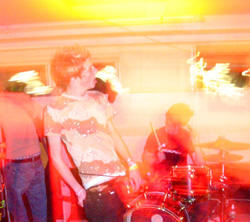 |
 |
 |
 |
| ::Interviews:: |
| review & interview content, as well as web site graphics & design, copywrite 2003-2004 Euphonia Online. use of materials granted only with reasonable purposes. |
 |
| interviewed by robby sumner |
 |
| Interview with Brandon May 25th, 2005 |
Dave Marion - Vocals Adam Fisher - Guitar, Vocals Mike Madruga - Bass Brandon Proff - Drums |
| E: So Brandon, your band--Fear Before The March Of Flames--has been playing a very distinctly raw sound for a little under three years now. When you first began experimenting with the sound that would carry you through your first two records, did you predict that there was going to be a solid audience of kids willing and ready to listen? Brandon: Not really... we kind of got a large backlash at the time, because everybody was still into pop-punk. *Laughs* Everybody said that we sucked horribly, terribly bad... and we still kind of get that, but now that's kind of died off, and everybody's into hardcore, so, it works. *Laughs* I guess. I mean, it's just weird, because we didn't think it was going to end up going the way that it did. Our sound has always been evolving, whether it be good or bad in people's opinions, so I don't really know what's going to happen next. But back then, we definitely didn't have plans to do something that was going to catch on the way it has for us, and for most bands that are doing stuff now like that. E: Do you find it difficult to create music that will stay popular with fans and not grow old after a short burst of attention? Brandon: Oh, definitely. Especially because I can say for us, specifically, that it's challenging--just like any sort of job you have or want to do, or being an artist--to do something that people consider... not really "immortal," but just something that's so good that they're going to want to hold onto for a long time. Especially in a genre where there's screaming and stuff--where you have to have a very specific taste for it. I have no idea what is going to happen with that. E: Have you been able to focus all of your time and energy on the band? Brandon: Yeah, we've been doing this full-time for almost two years. Everybody in the band was kind of hoping and planning on doing this for a living from the get-go, so we didn't really have anything else going on in our lives. We just decided out on the table that we were going to do the band, because it was what everyone wanted to do from the beginning. It's always been the top priority for us. E: Do you think that the recording process can ever be constrictive to the band's intense sound, especially when compared to how your music comes out live? Brandon: Oh, for sure. The live show aspect is amazing because of the fact that you never really know what's going to happen... you'll be in the most perfect setting, and have everything go wrong, or be in the most horribly awkward setting, and have the best show of your life, you know? And when you go to record, you have to put so much planning into it, and so it's kind of hard to know where the line is between planning too much and just sort of letting what happens, happen. And I think that for us, that's something that we tried really hard to do--to make sure we don't get too focused on having a perfect, clean product, and trying to capture the same feeling that we get when we're playing every night, you know? Whatever show it is where we just go, "Man, that was so much fun, and so crazy, and amazing." And so you really just hope that that's what happens. It definitely is a challenge. E: Would you assume that most of FBTMOF's new fans are attained through your live performance, or through experimental purchasing and/or downloading of your recorded material? Brandon: Live shows, most definitely. E: Fear Before The March Of Flames's vocalist, Dave, writes some breathtakingly great lyrics for the band's songs... but do you think it's somewhat stifling to know that the blunt emotion of your lyrical content is lost to many fans due to their inability to decipher the screaming live? Brandon: It's true that when you're in a band that has screaming, most people that aren't used to that kind of music write it off as just noise. I would hope that we would try as hard as we can as a band to make sure that people can try to catch what we're trying to say live... but if not, I just hope that whoever sees us or hears us live will go and try to find out what it is we're singing about, and find out what's driving us... what our passion is, and what we're using our music to try and say to people. E: Do you expect FBTMOF's sound to stay pretty consistent over the next few albums? Or will your style evolve--and if so, would you predict a mellower sound, or one that's even harsher than what you have now? Brandon: I honestly have no idea. We actually met up a few days ago as a band, because we just got back from tour, and we didn't really plan out what was going to happen... we just wanted to figure out ways to be a lot more productive. The general consensus among us was that we just wanted to write an album so we know if we're not ever going to be able to write something that is as acceptable and mainstream as bands like Radiohead and bands like that who we like, we want to at least try to write music that's just eerie and maybe more ambient at parts at... at the same time, we still want to write music that just sucks the oxygen out of your lungs and just suffocates you. And that's kind of what we've always been into, individually, as far as music goes. The ability to create something that causes you to feel that way, and we love that. But we also want to write something that we can really be proud of and be happy with that for the rest of our lives, you know? Just being musicians, and being able to say... you know, that's something we did. And just to make it as timeless as possible for what it is. E: Do you think that the music you write is the kind that can only be listened to when in a certain mood or atmosphere? Brandon: Well yeah, of course. I really feel that for me, it's that way with most kinds of music. You know, it all just depends on what your feeling on a day-to-day basis. It's just amazing how music can change your mood, and you listen to it to make you feel differently... or to help you gain clarity on what's going on. That's just really the way it seems like it is for everybody, I should think. E: Have the labels, producers, and other bands you've interacted with over the years shaped your songwriting techniques in any way? Brandon: Not directly. As far as the label goes, they've always just sort of stood back and let us do our thing. They've never put any sort of restrictions on us or anything like that, and I just think that out of our friendships that we've built with those people, they've been able to understand better who we are and what we're trying to do. The closest I think that a person would come to that would be Matt Ellard, who was our producer for Art Damage. I think what he did was he looked at our ideas on how to do something, and he would actually know the right way to do that--I mean, I guess that's a relative term, but we hired him to work on the record with us, so it was gonna be his insight on that, and he really gave us a lot of different viewpoints and showed us a lot of ways to just do something a little different to make it interesting and unique. E: A lot of your songs have a pretty negative tone to them--is it hard to play angry or depressing music, even as the drummer, when you don't match the mood of what you're playing? Brandon: You know, I've never really felt that in an extreme before. I just thought, "Well, this isn't making sense for what I'm feeling," but... I think that our music isn't really negative toward anybody specifically. It's more of our frustration about music today and just how commercialized it's become, and how people are just trying to make money off of everything they possibly can, and they're sacrificing so much of their integrity just for money. And because of that, there are people who are trying really hard, and they're giving so much of themselves for music, and those people don't get a chance to be heard because they're not doing something correctly in the business standards and stuff like that. And that's just the primary aggression I think our band has right now as we're playing. And it's very easy to feel that way and want people to know how we feel about that, and so because of that I guess I'm able to do it every night and be okay with it. E: Well thanks a whole lot, man. Take care. Brandon: You too--thanks! |